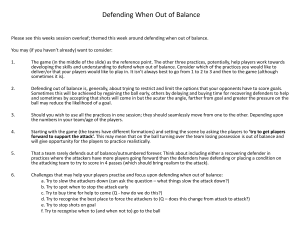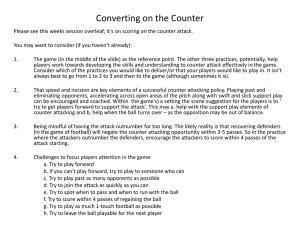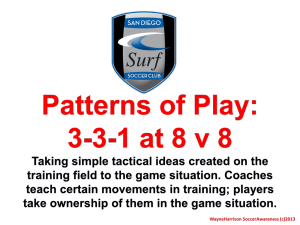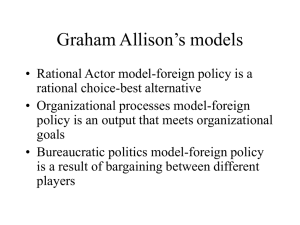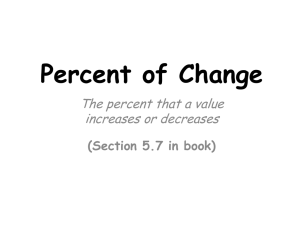Future Game – Adapting Practices
advertisement
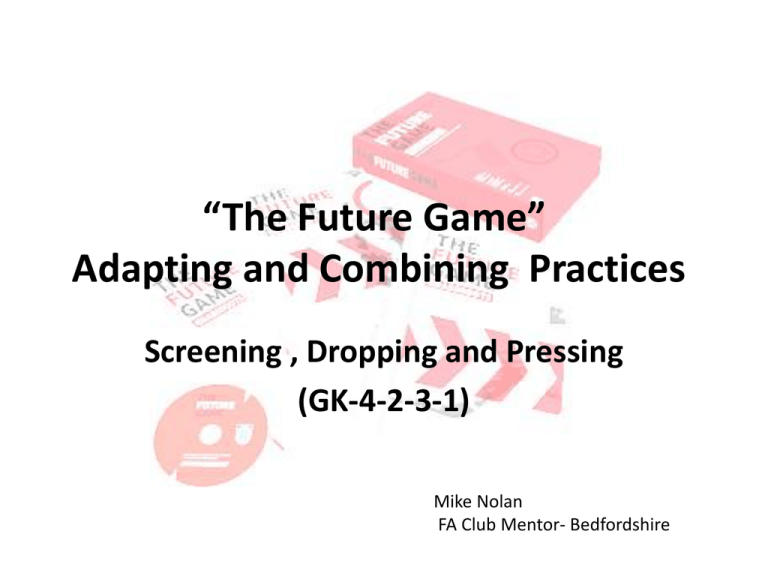
“The Future Game” Adapting and Combining Practices Screening , Dropping and Pressing (GK-4-2-3-1) Mike Nolan FA Club Mentor- Bedfordshire The practices in the Future Game are templates to be adapted for your players, rather than a prescriptive syllabus. You may find that some practices will work for your players as they are shown, some you will alter using STEP principles( different area size etc) but some you may find useful as a basis for a different training focus or age than that given in the Future Game. Some practices may be linked over a number of weeks as a developmental sequence. Others may be linked in the same session – perhaps as different Parts of the session in a linear way, or used together as a carousel or repetition circuit. You might find other ways of adapting and linking them that suit your intended outcomes. Practices may have multiple outcomes, especially when there is an element of opposition. For example, in a practice where we have two teams playing against each other and one is attacking with another defending We often set up the ‘opposition’ to get required scenarios and outcomes . In a Youth Award Module 3 type practice, we may give an attacking challenge to allow us to work on a defending focus; or in a UEFA B Phase of Play we may give the attacking team a scenario or style of play to allow us to coach a team a defending topic. So when looking at a session plan, we can think about what possible outcomes there may be for each player, each position regardless of the ‘headline’ session topic or focus. Perhaps we could adapt that session to give us more of those outcomes in a way that will meet our players needs. In this example we will look at two practices from the Future Game ‘Developing Possession’ and ‘Individual Defensive Awareness’ . We will adapt and link them to coach ‘Screening and Defending as a Unit ‘ (Playing in a GK-4-2-3-1)’ This practice is on page 54 of ‘The Future Game –Grassroots’ The challenges and progressions are mainly for the outside players as an attacking focus, with the defending pair challenged to intercept. This practice is on page 183 of ‘The Future Game –Grassroots’ The challenges and progressions are mainly for the unit of four defending players to adjust their positions to protect the gates ahead or the boxes behind them , with challenges for the attacking players to work the ball into or through those areas. In the above practices, you will see other ways of using them to work on your preferred outcomes. It is important to recognise where your practices fit into the game of football- if players know they are relevant to what they do on matchday, they may find it easier to engage with what you are trying to achieve. We are trying to help them build up a bank of pictures to help game memory- this will be more effective if they can picture where our practice sits in the context of the game. They should look as far as possible like a ‘Part’ of the game while still achieving your intended outcomes. Some of these Parts may work very well within a ‘Whole- Part- Whole’ structure, others may suit different frameworks. We are now going to look at using them to work on our defending in a GK-4-2-3-1 (You may see ways of adapting them to the format and formation of your players ) This is the formation we are coaching , and we will use the above practices to work on A- The partnership of our No 4 and No8 , particularly in screening the back four 9 10 11 B-The back four working as a unit 8 4 3 7 6 5 1 2 C- Our midfield two and back four working together . Of course in an ideal world, for this practice we will have 12 players but as ever we will have to be prepared to adapt to the numbers available. We will work back from our final set up and see if we can fit in the work we want to do within it with the minimum of changes. It is often easier to remove equipment as the session progresses than to add more. We have used different colours to differentiate between areas and gates The areas you use will be appropriate for your players, and feel free to adjust them during the session to alter challenges if necessary We will use areas A and B for the first part of our practice (after appropriate arrival activities and warm up) It’s always worth seeing how much of your work can be carried out using the same main area, or parts of it, to save time and space. This is Area A, perhaps start with an 8m x8m and see how it goes. Same in Area B We are adapting the ‘Developing possession’ practice. This will benefit all players, but in particular defensive partnerships such as the 4 & 8 or 5& 6 in our formation. It may link to others in yours. The outside players keep possession by playing across the square, and score a point for every pass that splits the defenders. Player Movement Ball Movement The defenders try to intercept and not allow any pass to split them. They stay inside the area You can rotate after the defenders make X amount of interceptions, or after a time limit. Ensure the outside players know they can move along the sides to support but can’t enter (at first) Bearing in mind our Key aspects of Individual Defending as well as Defending Principles, Coaching Points for the defending pair may include– -Distance between the pair to stop through balls -Being offset rather than flat - Speed and angle of approach -Speed of readjustment -Restraint -Body Shape -Different forms of communication (eg Body shape, hand signals, speed as well as verbal) Player Movement Ball Movement In these we can see opportunities to practice Depth, Delay, Concentration, Control and Restraint (For Balance we would have more defenders) And of course other secondary outcomes such as passing, receiving etc As in any practice, there is a ‘trade off’. This practice gives us a lot of opportunities to work on key aspects but it is not directional. 8 4 9 Player Movement Ball Movement In the game, our midfield pair would screen passes from the front and sides , it could be argued that it would not be realistic to have the opposition striker playing a ball back between them if s/he can turn and threaten the goal. However, it is realistic to defend passes from three sides of the area, and to have to recover their shape and adjust after being turned. So for our purposes, the trade off is worth it. You can add challenges as you feel appropriate, such as players RWTB or combining across the square if they recognise an opportunity to do so. This is one area in the game that our practice might fit, where . opposition 7, 10 or 11 try to combine /play to their striker , No9 9 10 11 4 and 8 try to screen or intercept these passes . 7 10 7 8 4 3 6 9 1 5 11 2 There may be other areas where it fits into your formation and playing philosophy eg within your defending unit, or ‘defending from the front’ T T Now we progress to the next Part . Here we set up 6v6 with 4 defenders (red)restricted to Zone C between gates and boxes Initially 2 defenders are restricted to Zone D and the practice runs as in the Future Game (Slide 6 above) Servers T play a ball to the 4 attackers , who make 3 passes before breaking out and scoring by either running the ball through a gate in front of the defending 4 or chipping the ball into the boxes behind them. Back 4 drop or press to stop the attackers scoring. If they win the ball, they try and score in either target goal before resetting. T T Challenges and scoring systems can be used to manage the attacking team. It may be that going through a gate is 1 point and clipping the ball in behind is 3 points. You may challenge a certain player to try and get through a gate, or award extra points if they do (to encourage their individual RWTB and Dribbling) Likewise you may encourage certain players to try to clip the ball in to improve that skill, possibly awarding extra points for using their ‘other’ foot. Other Individual/ unit/team challenges ? T T Next, we allow the front pair of defenders to drop into the next zone. Now they are screening , and the back four react to their actions – if the Midfield pair have pressure on the ball, the back 4 can push out. If not they may have to drop to protect the space behind. Now that we have an opportunity to work on all Defending Principles, Coaching points may include -Defending distances -Recognising triggers when to press drop (eg if no pressure on the ball and attacker shapes to clip the ball in) or slide if attack switches sides -Working as a unit/team T Next, we can allow one attacker to play as a striker (No 9) who can receive and turn into the boxes behind, or receive the ball in there 9 We could also use one of the players as a striker or No10 for the defenders to play into when they win the ball. Of course, if numbers allow , extra roles such as these can be created earlier to involve everyone, or simply have different overloads in different areas to cater for them You may have other conditions such as wide defenders leaving their zone to support the players ahead. Rotate players as appropriate We could also use one of the players as a striker or No10 for the defenders to play into when they win the ball. Of course, if numbers allow , extra roles such as these can be created earlier to involve everyone, or simply have different overloads in different areas to cater for them You may have other conditions such as wide defenders leaving their zone to support the players ahead. Rotate players as appropriate Now we can see how this practice fits into our formation 10 8 4 3 2 6 5 We can see here how these positions fit into our full . formation, giving the players a lot of pictures in training to draw on in the game . 9 11 10 7 8 4 3 (And of course we can go into a 6v6 , 7v6 etc depending on the players available) 6 5 1 2 T T It is important throughout that we consider where this practice fits into the game, and our defending philosophy. For example, in a match we would not drop off the ball in and around our penalty area. Here we would press in our ‘no tolerance’ zone to stop shots on goal. We also need to consider our style of play, as well as the state of the game . For example ,our decisions of where and when to press may be different at 1-0 up with ten minutes to go, than if we were 0-1 down. 27 So it may be that, at times, the area our back four are working in during the practice represents the area shown. The space behind them that they are protecting may expand or shrink as they move as a unit up and down the pitch, bearing in mind our actions in and around the penalty area Therefore , our goalkeeper is expected to be in an position to protect that space , and sweep long balls that are played into the deeper areas behind the defenders. Adjusting with play (to be as high as possible while remaining safe) , so that they are part of the defensive unit. 28 A Consider ways that a goalkeeper could be included in this practice, or in later progressions of it. It may be that you have GK A starting the practice , acting as pivot and stopping shots from the red team. 29 T Or it may be that you have GK B working on their position relative to the back four and the ball. The area may have to be changed, or a initial condition may be needed so that B does not ‘kill’ your practice by occupying the zone behind the defenders. As you review the practice ‘in action’ you can assess how you manage this. (It may be that the threat of being lobbed will be enough – perhaps this could be a challenge for the attackers?) B You can explore other ways of including your own keepers to suit their needs 30 • This is just one example of how Future Game Practices can be adapted and linked to give desired outcomes • These outcomes may be different to those mentioned, and may only become fully apparent as you review your sessions • Some of these will work well, some not very well at all 31 • But we won’t know until we plan, do and reflect • Have the confidence to give it a go, and share • Practices can now be shared with ‘The FA Coach’s App’ 32 • Thanks to FA Licensed Coaches Ricky Boxall, Phil Green, Ian James and Dennis O’Meara.
